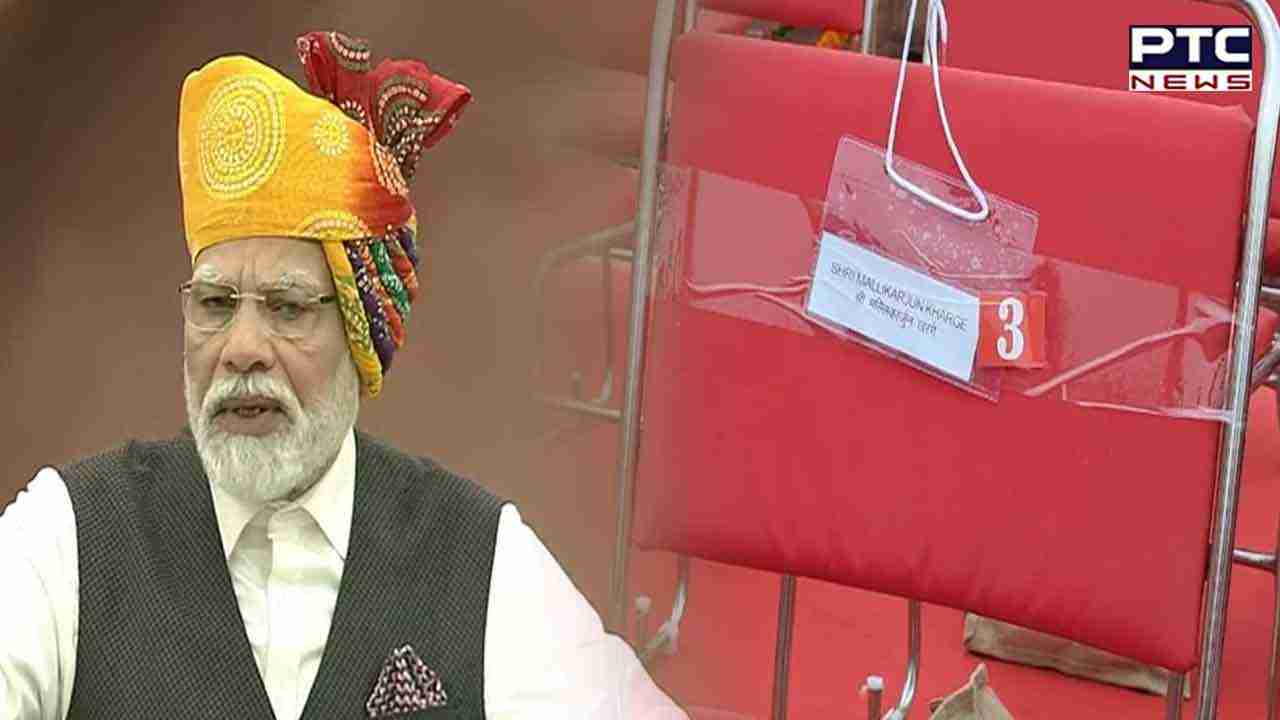Empty chair at Red Fort during PM Modis address conveys a message
Mallikarjun Kharge's labeled chair remained unoccupied during PM Modi's Red Fort speech due to his reported illness, confirmed Congress

New Delhi, August 15: Amongst the historic echoes of the Red Fort, where Prime Minister Narendra Modi delivered his address to the nation on the 77th Independence Day, an empty chair adorned with the name of Congress President Mallikarjun Kharge held a significant presence. The Congress party explained his absence by citing his health condition, stating that he was "not feeling well."
While PM Modi took to the podium, Mallikarjun Kharge chose an alternate way to make his presence felt. He sent out a pre-recorded message, wherein he shed light on the contributions of past Prime Ministers and openly criticized the current administration for its treatment of the opposition.

A distinctive chair marked with Mallikarjun Kharge's name occupied one of the unoccupied seats within a section of the iconic Red Fort, where PM Modi delivered his address.
Mallikarjun Kharge, in a departure from convention, raised the flag at the Congress office in Delhi for the first time as the party's president. In an unprecedented move, he also used the opportunity to voice his critiques of the government's policies—a break from the tradition of refraining from criticism on Independence Day, as noted by the Congress.
Kharge attributed his absence from the Red Fort to an eye ailment. He also noted his duty to hoist the flag at both his residence and the Congress office. "With so much security for the PM, and then they don't allow us to leave until the Home Minister, Defence Minister, and Speaker leave, so it would have been impossible to attend it," stated the Congress chief.
In his recorded message, Kharge paid homage to revered freedom fighters such as Mahatma Gandhi, Jawaharlal Nehru, Sardar Vallabhbhai Patel, Netaji Subhash Chandra Bose, Maulana Azad, Rajendra Prasad, Sarojini Naidu, and BR Ambedkar.
He highlighted the notable contributions of India's inaugural Prime Minister, Jawaharlal Nehru, as well as other Congress Prime Ministers, including Indira Gandhi, Lal Bahadur Shastri, Rajiv Gandhi, PV Narasimha Rao, and Manmohan Singh, to the nation's progress. Kharge even acknowledged the role of BJP stalwart Atal Bihari Vajpayee.
"The legacy of every Prime Minister has contributed to the advancement of our nation. Yet today, some individuals attempt to project that development has occurred only in recent years," remarked the Congress President, in an indirect reference to PM Modi.
"Every Prime Minister, along with Atal Bihari Vajpayee, devoted their efforts to the nation's growth. Regrettably, today democracy, the Constitution, and autonomous institutions face grave threats. Novel methods are employed to stifle the opposition's voice. Not just CBI, Enforcement Directorate, and Income Tax raids, even the Election Commission's authority is being eroded. Opposition MPs are being silenced, suspended, mics are muted, and speeches expunged..."
Kharge cited the establishment of Indian Institutes of Technology (IITs), Indian Institutes of Management (IIMs), AIIMS, space and atomic research as indicators of progress that he believed the current government has undermined. Nehru, he emphasized, also nurtured art, culture, and literature in post-independence India.
He attributed India's self-reliance to the policies of Lal Bahadur Shastri and Indira Gandhi, employing one of PM Modi's signature slogans.
"Great leaders do not obliterate past history to fashion new narratives. They do not seek to rename everything. They've renamed previous schemes, infrastructure projects, and they're dismantling democracy through authoritarian methods. Now, even laws that were foundational to the country's peace are being renamed. First, it was 'acche din,' then 'new India,' and now 'Amrut Kaal'—aren't these name changes an effort to mask their shortcomings?" Kharge questioned.
In his tenth Independence Day address, PM Modi took aim at opposition parties, particularly the Congress, denouncing "corruption, nepotism, and appeasement" as the trio of evils that the nation must break free from.
"Some problems have permeated our system over the last 75 years. Certain parties have embraced dynastic politics, transforming the party into one that is of the family, by the family, and for the family," PM Modi asserted, refraining from naming the Congress directly.
Also Read: Independence Day 2023: PM Modi appeals for peace in strife-torn Manipur in 10th I-Day address
